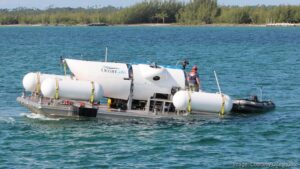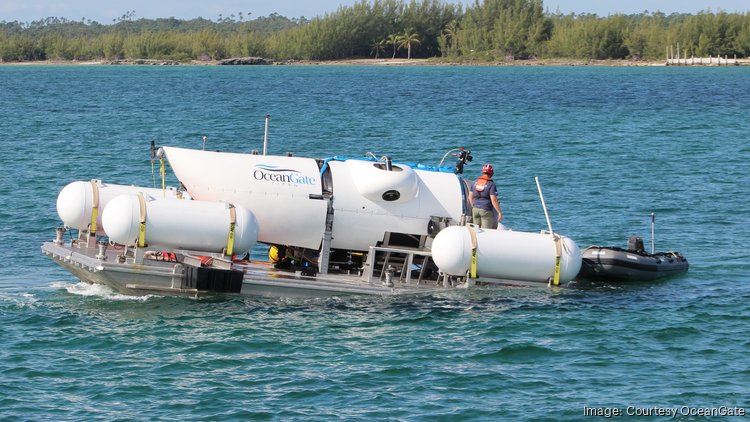Article published in the Philadelphia Business Journal on July 10, 2023. Revised 7 am.
Not a day goes by when the tragic loss of the submersible vessel Titan is not in the news. Titan imploded on June 18 with OceanGate’s CEO Stockton Rush and four paying tourists on board as it descended to view the Titanic wreck lying at a depth of 12,500 feet.
Rather than titanium or steel, Titan’s hull was constructed using a five-inch thick laminated carbon fiber composite, which is strong when the fibers are under tension but not under compression, especially under the immense water pressure at the depth at which Titanic lies.
Titan had made multiple trips to Titanic prior to June 18. Each successive dive cycle fatigued the hull’s carbon fiber composite which caused it to delaminate, resulting in a catastrophic implosion and the loss of the vessel and the lives on board.
To give the design an aura of credibility, Rush claimed that Boeing, NASA and the University of Washington were partners with OceanGate in the development of Titan’s carbon fiber hull. All three organizations claimed that this was not true.
Rush failed to listen to experts—a cardinal sin in the area of safety. In 2018, David Lochridge, OceanGate’s director of marine operations, wrote to a former employee, “I don’t want to be seen as a Tattle tale but I’m so worried he kills himself and others in the quest to boost his ego.” OceanGate fired Lochridge for divulging confidential information. Lochridge claimed he was fired for raising safety issues with Titan. Lochridge countersued, claiming whistleblower status. The cases were settled out of court.
Rush knew of the risk of delamination and subsequent implosion. He installed an acoustic monitoring system to warn of delamination, with the objective of providing sufficient warning so that the vessel could resurface. Most likely there would be insufficient time to resurface prior to implosion.
If there was a risk of delamination, why use carbon fiber composite? Rush used poor critical judgment.
In a 2022 interview with CBS journalist David Pogue, Rush said, “You know, at some point, safety just is a pure waste. I mean, if you just want to be safe, don’t get out of bed. At some point, you’re going to take some risk, and it really is a risk/reward question. I think I can do this just as safely by breaking the rules.”
Safety is just a pure waste? Wrong. One doesn’t break the rules when it jeopardizes the safety of tourists on board.

Rob McCallum, an expert on deep sea water submersibles, wrote an email to Rush in March 2018, stating, “you are wanting to use a prototype … [that has not been certified by an independent third party] in a very hostile place. As much as I appreciate entrepreneurship and innovation, you are potentially putting the entire industry at risk.”
Rush wrote back, “I know that our engineering focused innovative approach … flies in the face of submersible orthodoxy, but that is the nature of innovation. We … have heard the baseless cries of ‘you are going to kill someone’ way too often.”
In a June 2019 article in the Smithsonian, Rush is quoted as saying, “There hasn’t been an injury in the commercial sub industry in over 35 years. It’s obscenely safe because they have all these regulations. But it also hasn’t innovated or grown—because they have all these regulations.”
Perhaps there hasn’t been a commercial sub industry accident in over 35 years because regulations are strictly followed and safety is mission critical. Did Rush consider safety as mission critical? Apparently not.
Rush had his tourists sign waivers warning of the chance of death during their trip on Titan. Mike Reiss, who previously descended on the Titan to the Titanic, said, “Before you even get on the boat, there’s a long, long waiver that mentions death three times on page one.
Do these waivers protect OceanGate against liability? The question of jurisdiction is murky. At a minimum, OceanGate is guilty of gross negligence or recklessness and will face lawsuits. On July 6, OceanGate ceased operations.
A primary responsibility of all CEOs is to ensure the safety of those who place their trust in them. Risking one’s own life to advance technology is one thing. Risking the lives of others is quite another. Stockton Rush showed a callous disregard of his responsibility to his passengers.
Stan Silverman is founder of Silverman Leadership and author of “Be Different! The Key to Business and Career Success.” He is also a speaker, advisor and widely read nationally syndicated columnist on leadership. He can be reached at Stan@SilvermanLeadership.com.

